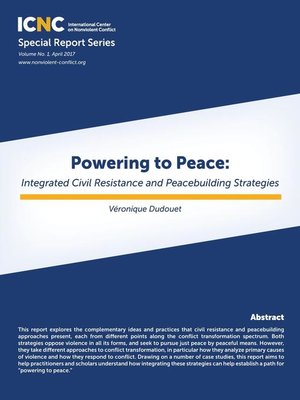Powering to Peace
ebook ∣ Integrated Civil Resistance and Peacebuilding Strategies
By Veronique Dudouet

Sign up to save your library
With an OverDrive account, you can save your favorite libraries for at-a-glance information about availability. Find out more about OverDrive accounts.
Find this title in Libby, the library reading app by OverDrive.



Search for a digital library with this title
Title found at these libraries:
| Library Name | Distance |
|---|---|
| Loading... |
This report explores the complementary ideas and practices that civil resistance and peacebuilding approaches present, each from different points along the conflict transformation spectrum. Both strategies oppose violence in all its forms, and seek to pursue just peace by peaceful means. However, they take different approaches to conflict transformation, both in their analyses of the primary causes of violence and how they respond to conflict. The report then describes how civil resistance and peacebuilding can work in tandem throughout the four stages of transformation of asymmetric conflicts. Concrete examples are provided to illustrate the respective functions of constructive conflict (through civil resistance) and conflict mitigation (through peacebuilding) in transitions from latent to overt conflict, from resistance to dialogue and negotiation, and from conflict settlement to sustainable peace. It highlights in particular:
into mutually acceptable negotiated outcomes and to reconcile polarized relationships in the
wake of nonviolent struggles; and
and oppose autocratic backlashes, to resist anti-emancipatory, and 'neoliberal' tendencies within
post-war peacebuilding operations, or to put pressure on all stakeholders to implement their
commitments to progressive state reforms and social justice.
The conclusion highlights takeaways for researchers, nonviolent activists and educators, peacebuilding practitioners and international agencies seeking to support constructive, effective conflict transformation.







